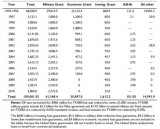List of author's articles

Current US foreign policy in the Middle East peace process
1. US policy and the Israeli-Palestinian peace process Although the United States was involved in the Middle East before World War II, it did not begin to pursue a more active policy in the region until after the end of World War II. However, only since the 1960s can we speak of a "special relationship" between the United States and Israel, which continues to last until today. There are more answers to the question of where the roots of the important relationship between the two countries come from. East after 1945 can be explained on the one hand by the interest in oil, later also by anti-communism and the struggle for spheres of influence within the bipolarism characteristic of the Cold War.
🕔︎ 07.12.2011
👁︎ 11.459

Current US foreign policy in the Middle East peace process
Introduction When we say Middle East today, everyone is probably reminded of the revolution in Egypt, the uprising in Syria, or the fighting in Libya. The Middle East is currently a symbol of the unrest and revolts that could bring about changes in the policies of these Arab countries in the coming years. In connection with the crisis in the Arab world, there is also talk of the future of a small country that has been fighting for its existence since its inception - the future of the State of Israel.
🕔︎ 07.12.2011
👁︎ 8.692

Current US foreign policy in the Middle East peace process
2. Israel and the USA - a special relationship Relations between the United States and Israel have been exceptional since the establishment of the State of Israel. Since the 1960s, there has even been talk of a so-called special relationship, which exists between the two countries and has no analogues in the world. For decades, the two countries have maintained strong bilateral relations based on several factors - common strategic goals in the Middle East (eg Iran, Syria or Islamic extremism), sharing democratic values and historical roots dating back to the very founding of the State of Israel.
🕔︎ 07.12.2011
👁︎ 11.579

Current US foreign policy in the Middle East peace process
3. The Obama administration in the peace process The Obama administration in 2009 was faced with a difficult task during the Israeli-Palestinian conflict. Bush's attempts to end the disputes, presented by the Annapol Conference, were in ruins, Israeli Prime Minister Ehud Olmert would be forced to resign due to allegations of corruption, and a war broke out in Gaza just before Obama's inauguration.
🕔︎ 07.12.2011
👁︎ 10.008

Current US foreign policy in the Middle East peace process
Conclusion The United States undoubtedly plays an important role in the Israeli-Palestinian peace process. Whether they were negotiators, mediators or observers, they made a significant contribution to advancing the Israeli-Palestinian peace talks.
🕔︎ 07.12.2011
👁︎ 8.044

Current US foreign policy in the Middle East peace process
When we say Middle East today, everyone is probably reminded of the revolution in Egypt, the uprising in Syria, or the fighting in Libya. The Middle East is currently a symbol of the unrest and revolts that could bring about changes in the policies of these Arab countries in the coming years. In connection with the crisis in the Arab world, there is also talk of the future of a small country that has been fighting for its existence since its inception - the future of the State of Israel.
🕔︎ 07.12.2011
👁︎ 6.789
Join us
We believe that there are people with different interests and experiences who could contribute their knowledge and ideas. If you love military history and have experience in historical research, writing articles, editing text, moderating, creating images, graphics or videos, or simply have a desire to contribute to our unique system, you can join us and help us create content that will be interesting and beneficial to other readers.
Find out more